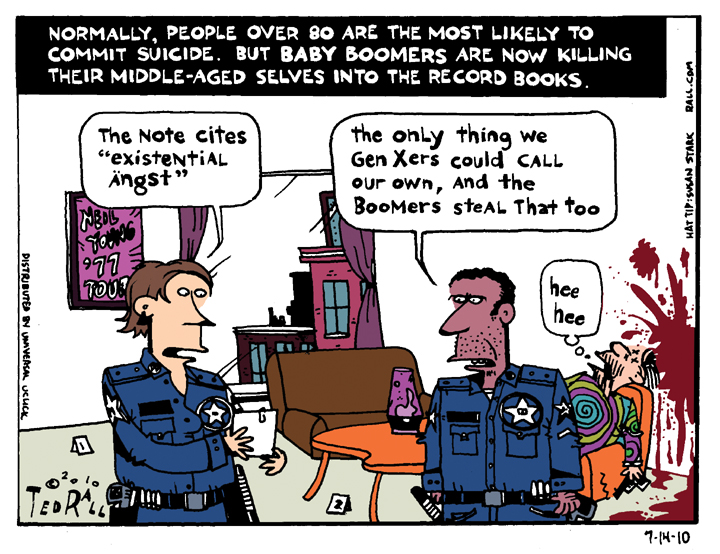Boomer suicide rates are spiking. Guilt?
SYNDICATED COLUMN: Smells Like Bob Dylan
Why Obama is Just Another Boomer
Barack Obama, people are saying, is the first Generation X president. Are they right? And if so–does it many any difference?
“The battle for the Democratic nomination in the U.S. presidential election,” reported Agence France Presse wire service nearly a year ago in January, “is as much about ‘Generation X’ wresting power from Baby Boomers as it is a battle between Barack Obama and Hillary Clinton…Most significantly, analysts say, it is the first time someone from the so-called Generation X has run for the White House.”
A Gen X president is, or would be, a big deal. Xers’ major concerns–student loan debt, underemployment, age discrimination against the young, the environment–have never gotten much attention in the media or in mainstream politics. But is Obama Gen X?
Membership requirements for Gen X have long been fungible. Demographic purists say Generation X began with those born after 1964, when a sharply dropping birth rate marked the end of the postwar Baby Boom. Sociologists, who look to common cultural and economic reference points as generational signifiers, include everyone born from 1961 to 1976. If you grew up with LBJ, Nixon and Hendrix, you’re a Boomer. If your touchstones are Carter, Reagan and Molly Ringwald, you’re X.
Some analysts put Gen X as late as the 1981 birth year, but I side with Canadian author Douglas Coupland because, well, he wrote the book. When Coupland published “Generation X” in 1990, its subjects were twentysomethings. Do the math. That includes anyone born in the 1960s.
By any account, Obama’s birthdate–1961–barely admits him to Gen X. Yet Gen X won him the presidency. Sure, a higher proportion of Gen Y voters than Gen Xers supported Obama (66 to 52 percent). But twice as many Xers showed up at the polls. The One couldn’t have done it without the X factor.
Prominent Xers embraced Obama early in the process. “[Obama] attended an anti-apartheid rally in Southern California,” said “X Saves the World” author Jeff Gourdinier during the early primaries. “He writes about his doubts about the effectiveness of that form of protest…He is very honest about his skepticism. That is the Gen X sensibility.”
“Our time to lead has come,” gushed Elizabeth Blackney, a 35-year-old Republican blogger from Oregon. But she and the rest of my underemployed, underrecognized generation may have to wait. Now that Obama has our votes, he has a lot more love for Generation Y than for Generation X.
The Nation, the Bible of liberal Baby Boomers, is atypically smart on this point. “For Obama, who is 46, and his followers, Boomer politics clearly have to go,” writes Lakshmi Chaudhry of the 1980s and 1990s “culture wars,” which constantly rehashed Vietnam and other hoary so-last-century conflicts. “What is less obvious is whom Obama represents. He often speaks to the Millennials, recently telling cheering college kids in South Carolina, ‘It’s your generation’s turn.’ But rarely mentioned is Obama’s own generation, i.e., Generation X, the Lost Generation, whose name has been virtually erased from the national conversation.”
In my 1998 Generation X manifesto “Revenge of Latchkey Kids,” I called it “generational leapfrog.” Generational leapfrog is the tendency of the good things in American life–high-paying entry-level jobs, generationally directed social programs, free love–to jump from the Baby Boomers born between ’46 and ’64 to their children, Millennial/Generation Y types born after ’77.
It happened in editorial cartooning, my chosen profession. The vast majority of political cartoonists working at daily newspapers, those who get decent salaries and actual benefits, are Boomers in their 50s and 60s. If and when a new job opens up, it goes to an artist fresh out of college–a Gen Yer. Thirtysomething and fortysomething Gen Xers need not apply.
Demographers William Howe and Neil Strauss predicted this phenomenon in their 1991 book “Generations.” They argued that Xers belong to a “reactive” generation doomed to be ignored by everyone that matters–Hollywood, Madison Avenue and Washington. Like prior “reactive” generations (the last one was Hemingway’s “Lost Generation”), they will probably not see one of their own become president.
Howe and Strauss note that members of a generation can exhibit cultural signifiers and other traits more closely related to another generation. As a self-identified Gen Xer (1963/age 45), I spent my college years attending concerts by late-period Blondie, the Dead Kennedys, Flipper and the Clash. Punk rock and New Wave defined my coming of age. Like most of my peers, I later got into post-punk and grunge bands like Nirvana. But many of my classmates were more into the Doors and Bob Dylan. Born too late to enjoy the Summer of Love, they nevertheless identified as Boomers.
By this measure, Obama is a Boomer. His favorite music? According to his Facebook page: “Miles Davis, John Coltrane, Bob Dylan, Stevie Wonder, Johann Sebastian Bach (cello suites), and The Fugees.” Yech. His favorite movies? “Casablanca, Godfather I & II, Lawrence of Arabia and One Flew Over the Cuckoo’s Nest.” Great films. I love them all. But a Gen Xer would have been more likely to namecheck “Repo Man” and “Slacker.”
Generation Xers who hope that one of their own is finally in a position to address their long ignored concerns had better believe this: Obama is paying attention to the young and the old. You in-between types, still paying off your college loans and facing discrimination in the workplace because of your age, will have to keep on keeping on the best as you can.
COPYRIGHT 2008 TED RALL



